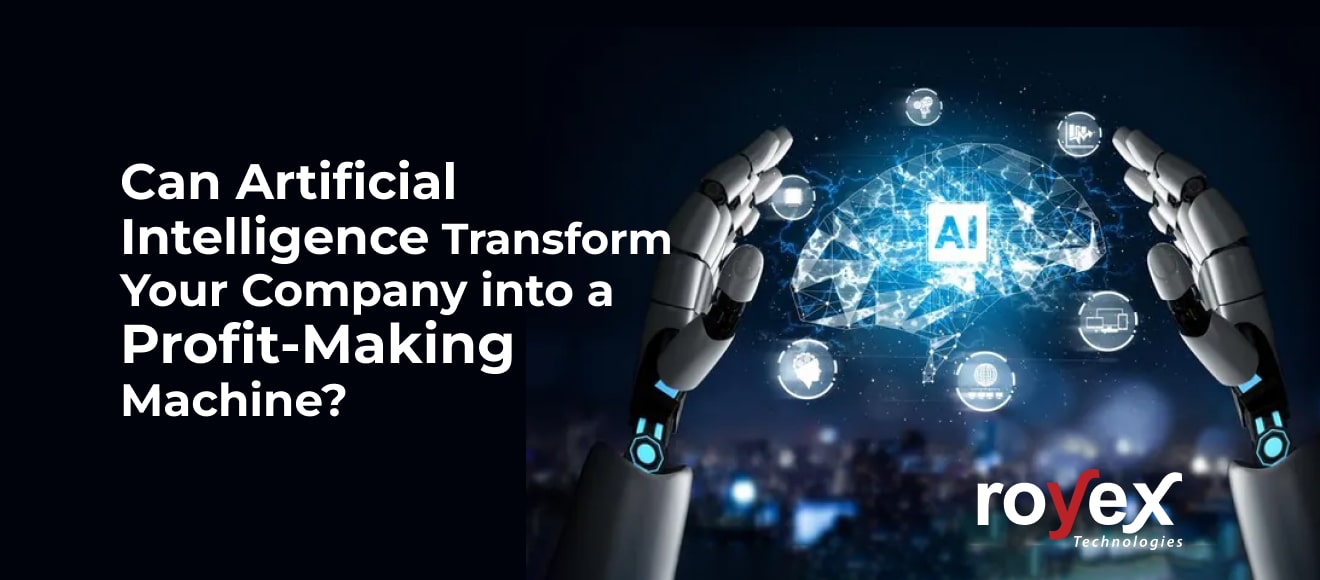
Can Artificial Intelligence Transform Your Company into a Profit-Making Machine?
You may have heard a lot about artificial intelligence (AI) recently and its potential to transform various aspects. AI involves computer systems that learn autonomously, reason, and make choices independently. But how this technology could actually boost business profits is an interesting discussion we should have.
Essentially, AI enables machines to perform tasks intelligently, mimicking human cognition and learning processes. Advanced AI systems leverage vast datasets to train algorithms that can predict outcomes and make decisions effectively without needing explicit programming for every possible situation much like how children learn from experiences rather than just following given instructions.
So how could this smart technology help a company make more money? There are several key ways:
Making Operations More Efficient

AI excels at processing and analyzing enormous datasets that would be impossible for humans to make sense of manually. By ingesting all the intricate data around manufacturing processes, supply chain logistics, energy consumption patterns, and more, AI systems can pinpoint inefficiencies, wasteful spending, production bottlenecks, and areas for optimization with precision. AI models can determine the ideal factory machine settings to minimize defects, map out the most fuel-efficient transportation routes, identify energy hogs ripe for upgrades, and endlessly more. With AI's powerful pattern recognition and machine learning capabilities, it can uncover opportunities to streamline operations that would likely go unnoticed by human employees. This granular operational intelligence allows companies to squash costs, reduce downtime, maximize output and drive up profit margins. Key areas where AI drives operational efficiency include:
-
Predictive maintenance to avoid costly equipment failures
-
Demand forecasting to optimize inventory and production planning
-
Anomaly detection to quickly resolve process issues
-
Optimization of resource allocation and scheduling
-
Automation of repetitive tasks and quality control
-
Minimizing supply chain delays and shortages
-
Energy use optimization across facilities
-
Improving manufacturing yield and reducing defects
By leveraging AI to make data-driven operational improvements across the board, companies can significantly cut costs while increasing productivity and consistency - a direct boost to the bottom line.
Revenue Growth Through Intelligent Decisioning
In addition to reducing operational costs, companies can leverage AI to drive more revenue through smarter decisioning backed by data. AI is extremely adept at analyzing large datasets to make accurate predictions that humans can't. This unlocks a plethora of revenue-boosting opportunities:
-
Demand Forecasting: AI models can precisely forecast product demand by studying historical sales data, market trends, pricing data, and more variables. This allows companies to optimize production, inventory management, and dynamic pricing/promotion strategies.
-
Personalized Customer Experiences: By understanding each customer's preferences and behaviors through data, AI personalizes product recommendations, marketing content/offers, customer support experiences and more to increase engagement and conversions.
-
Sales Optimization: AI can prioritize the hottest sales leads to pursue, forecast sales pipeline, and guide reps to take the ideal next actions to close deals faster based on predictive intelligence.
-
Targeted Marketing: AI automates audience segmentation, multichannel campaign deployment, A/B test optimization and budget allocation across channels for more cost-effective marketing that maximizes returns.
Streamlining these types of data-driven decisions through AI enables companies to work smarter and be more tactical in their revenue-generating efforts. AI's consistent, scalable decisioning avoids the biases and missed opportunities that come with gut-based human decision making.
Accelerating Innovation Cycles
Beyond cost savings and smarter revenue strategies, AI is also a powerful catalyst for accelerating innovation cycles to develop superior, disruptive products/services faster than competitors. AI and machine learning techniques like generative adversarial networks, reinforcement learning, and automated modeling can spark novel ideas, designs and formulas that human researchers likely wouldn't think of.
For example, an AI system ingesting massive datasets on customer preferences, researching existing solutions, and simulating performance trade-offs could potentially generate thousands of innovative new product designs in a fraction of the time it would take human designers. AI could then rapidly prototype, test and optimize the most promising concepts through techniques like generative design and computational creativity.
On the research front, AI frees data scientists from repetitive data wrangling and analysis tasks through automation. This allows them to focus more on the higher-level insight generation, hypothesizing, and experimentation to drive innovation faster. AI also helps bridge expertise gaps by curating institutional knowledge to augment human skills and workflows.
Improving Products & Customer Experience
AI opens up a world of possibilities for creating better, more tailored products and elevated customer experiences. On the product development side, AI allows companies to rapidly prototype, test, and iterate on new offerings by analyzing reams of voice-of-customer data, market research, demographic info and more. AI and machine learning techniques like generative design, computational creativity, and reinforcement learning can actually spark novel product ideas and designs rather than just optimizing existing ones. For customers, AI powers hyper-personalized product recommendations, predicts needs and issues, and enables seamless automated support through chatbots and virtual assistants. AI can even automate customer outreach and dynamic pricing based on demand sensing. By analyzing each individual's preferences, behavior, and sentiment, AI crafts unique end-to-end experiences that boost satisfaction and brand loyalty. Key ways AI enhances products and CX include:
-
Automated product design and rapid prototyping
-
Customer preference and demand prediction modeling
-
Generative AI for sparking creative new product ideas
-
Hyper-personalized product recommendations
-
AI-powered customer service chatbots and assistants
-
Dynamic personalized pricing and discount optimization
-
Product quality control and defect prevention
-
Proactive issue detection and preventative support
-
Voice/sentiment analysis to gauge customer emotions
-
Automated, adaptive user experience personalization
Companies can use AI to delight customers with smooth, customized experiences and speed up innovation through agile product development. This empowers them to enhance their offerings and excel over their competitors.
Boosting Sales & Marketing Efforts

AI enables companies to take a sophisticated, data-driven approach to every aspect of sales and marketing. By leveraging machine learning to analyze huge datasets around customer demographics, market trends, competitor intel, historical sales data and more, AI can make accurate predictions that allow businesses to precisely target their efforts for maximum impact. AI lead scoring models can identify the hottest, most qualified sales prospects to prioritize. Demand forecasting AI analyzes past patterns to optimally stock inventory and set pricing. AI also powers real-time personalized marketing across channels like email, social media, the web and even direct mail by automatically generating creative content and offers tailored to each potential customer's preferences and behaviors. Behind the scenes, AI handles tasks like audience segmentation, A/B test optimization, and budget allocation across campaigns. The result? Smarter sales processes, tailored customer experiences, reduced marketing costs and bigger revenue gains.
Key areas where AI drives sales and marketing impact:
-
Predictive lead scoring and prioritization
-
Customer data mining and segmentation
-
Conversion rate optimization through A/B testing
-
Churn risk modeling to retain customers
-
Content personalization and dynamic creative optimization
-
Multichannel campaign orchestration and audience targeting
-
Demand forecasting and dynamic pricing/promotion strategies
-
Sales process optimization and next-best-action recommendations
-
Customer sentiment analysis from voice/text across channels
-
Sales forecasting and pipeline management
By infusing AI across the entire sales and marketing funnel, companies can efficiently identify prospective buyers, personalize engagements, predict demand fluctuations, and ultimately boost conversions and long-term customer value.
Cutting Costs Across the Board
One of AI's most tangible value propositions is utilizing it to analyze operational data and streamline processes for peak efficiency. AI excels at ingesting vast datasets around manufacturing, logistics, energy management, and more to pinpoint costly inefficiencies that humans likely can't detect. For example, an AI system could study a factory's production data to determine the optimal machine settings and sequencing to minimize defects and downtime. Or it could ingest years of fuel logistics data to plan the most efficient, cost-effective shipping routes.
AI's machine learning capabilities can also predict when equipment and assets will require maintenance before they break down, avoiding unplanned downtimes and emergency repair costs. This predictive maintenance is a huge cost-saver for asset-intensive businesses. AI can further cut labor expenses by automating repetitive tasks like data entry, transaction processing, monitoring systems, and more. The potential cost savings are substantial when systematically applying AI to make data-driven process improvements.
Key AI implementation challenges include:
-
Data quality, completeness and bias issues
-
Legacy process/system integration complexities
-
Employee resistance and lack of AI literacy
-
AI ethics risks like privacy violations and bias
-
Shortage of internal AI talent and upskilling needs
-
Regulations and governance overhead
-
Challenges achieving return on AI investments
While the potential is unquestionably transformative, responsibly and successfully operationalizing AI at scale requires a proactive, multi-faceted strategy carefully tailored to each organization's unique situation. Those that take shortcuts are likely to see implementation struggles, disillusionment, and waste rather than profits.
Clearing the Implementation Hurdles
While the revenue growth and cost savings potential is undeniably exciting, companies can't simply plug in an AI system and print money. There are significant organizational hurdles that must be cleared thoughtfully:
-
Data Readiness: AI models are only as effective as the training data used. This requires robust strategies for collecting, cleaning, labeling and managing high-quality data across business functions. Incomplete, disorganized or biased data will lead to bad AI outputs.
-
Change Management: Deploying new AI systems in production requires comprehensive change management efforts to redesign workflows, reskill employees, secure executive buy-in, and manage cultural resistance.
-
AI Ethics: As AI takes on more autonomous decision-making responsibilities, companies must have strong governance programs to ensure privacy, security, fairness, transparency, and accountability in how AI operates.
-
Talent/Skills Gaps: There is a significant shortage of AI talent and experience at most companies. Hiring new expertise and upskilling existing staff through training programs is crucial.
-
Measuring ROI: AI implementation requires patient, long-term investments that show gradual returns as models improve over time. Defining the right AI KPIs and realistic ROI timelines is key.
The most successful companies taking a holistic approach - bridging data silos, instilling AI literacy across the organization, cultivating AI talents, and implementing robust governance and processes. Those that take shortcuts or view AI as a plug-and-play silver bullet inevitably struggle.
From uncovering hidden cost savings to driving revenue-generating predictions to catalyzing product innovation cycles, the monetary benefits of AI are far-reaching for those that properly harness it. While enormously powerful, it's still an intricate and emerging technology that requires thoughtful human guidance. When wielded responsibly with the right processes and safeguards in place, AI can indeed transform companies into money making machines over time. The time to develop deliberate AI strategies is now for businesses seeking a sustained competitive advantage.
AI offers a plethora of options suitable for various company sizes and financial capacities. Should you require internal expertise to navigate suitable tools for your business, consulting a leading artificial intelligence (AI) company in Dubai, like Royex Technologies, can prove invaluable.
Check our portfolio to see our previous works. Contact us via email at info@royex.net or call us at +971566027916. To get started with us.





